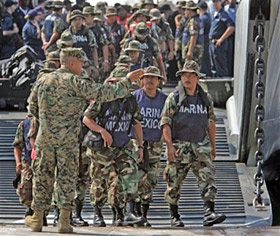 |
 |
 |
 Editorials | At Issue | September 2005 Editorials | At Issue | September 2005  
Mexico Takes Pride in Helping U.S.
 The Ledger The Ledger


| | Soldiers from the Mexican Navy disembark from an American Navy vessel on the beach in Biloxi, Miss. The Mexican troops were helping clean-up the devastation left behind by Hurricane Katrina. (Photo: Rob Carr) |
Among the 94 countries that have offered aid to the United States in the wake of Hurricane Katrina, none is more symbolic of a difficult friendship than Mexico. Katrina forced the United States and Mexico to cross years and miles of border resentment and suspicion. The neighbors transcended national and personal boundaries in the face of catastrophe to find their humanity.

It's estimated that 145,000 Mexicans were affected by the hurricane, 10,000 of them in New Orleans.

With President Bush's approval, President Vicente Fox sent a Mexican Peace Corps to help his neighbor.

Fox proudly told his people: "This is Mexico: It's solidarity, love, caring, capable of conquering adversity. For this reason, we have a stronger Mexico, a more democratic Mexico, a free Mexico, a working Mexico."

Mexican sailors from the ship Papaloapan docked last week off the coast of Biloxi, Miss., and began unloading supplies for the hurricane victims. Their ship brought along rescue helicopters, vehicles and water.

For many Tejanos and Mexican immigrants, the sight of the 45-truck Mexican troop convoy rumbling across the border along Interstate 35 on its way to San Antonio stirred pride and cheer. Many locals waved the Mexican flag and shouted, "Bienvenido!" -- Welcome!

Mexican troops hadn't advanced this far north since 1846, at the start of the Mexican-American War.

At that time, the Mexicans claimed that their land began at the Nueces River. The United States insisted that its southern border was the Rio Grande. Troops clashed in the disputed land between the rivers, and war was declared.

After two years of fighting, Mexico and the United States signed the Treaty of Guadalupe Hidalgo. Mexico ceded lands that would become America's Southwest and West for $18.25 million.

Many Mexican citizens north of the Rio Grande suddenly found themselves to be U.S. citizens. An often-repeated, wry comment by Mexican-Americans who claim a long family residency in the conquered lands is that they didn't cross the border -the border crossed them.

But this time, unarmed Mexican soldiers, sailors, engineers, physicians and nurses came to conquer fear, hunger and sickness. U.S. citizens were able to see the true might of a foreign people: the sharing of talent and resources to ease the pain of another foreign people.

Minutemen, take note: From the halls of San Antonio to the shores of Mississippi, Mexican soldiers and sailors in plain view feed, comfort and heal the citizens whom you seek to protect. Don't be surprised to see thousands of immigrants take part in the massive cleanup and rebuilding of New Orleans and other hard-hit Southern cities. As Fox said, Mexicans are a working people.

Their time would be better spent if they followed the Mexicans' example and volunteered to assist fellow citizens displaced by Katrina. If not, they should turn the binoculars on one another and peer into their hearts to track their fears. Cross the border, Minutemen, from shadow land to helping hand.

Despite the rancor on both sides of the border about past wars, spilt blood, lost land, drug trafficking and illegal crossings, demographic reality and natural calamity have forced us to recognize that the future demands reconciliation and cooperation.

Mexicans and U.S. citizens must cross their Rubicon, knowing that they shall not return to futile construction of walls, moats and fences. It's too late: Mexicans are here to stay.

Latino numbers have grown so exponentially that Texans have come to a cultural crossroads. They can travel the path of harmonious blending of heritages to become a showcase to the country and the world, or they can follow the road historically more trekked by jealous countries -one of bitterness and hostility.

If the first path is taken, American presidents and governors can bring those neighbors in conflict -- Israelis and Palestinians, Roman Catholic and Protestant Irish, Indians and Pakistanis -to the yellow rose state and explain that we've learned to respect one another. We've managed to defuse our fears of difference and to identify our common humanity. We can do so because we shed the ethnic and class arrogance that blinds us to the good in other peoples.

Katrina washed away buildings, levees and borders. Mexico and the United States can rebuild American cities as their citizens proudly wave both flags. | 
 | |
 |



